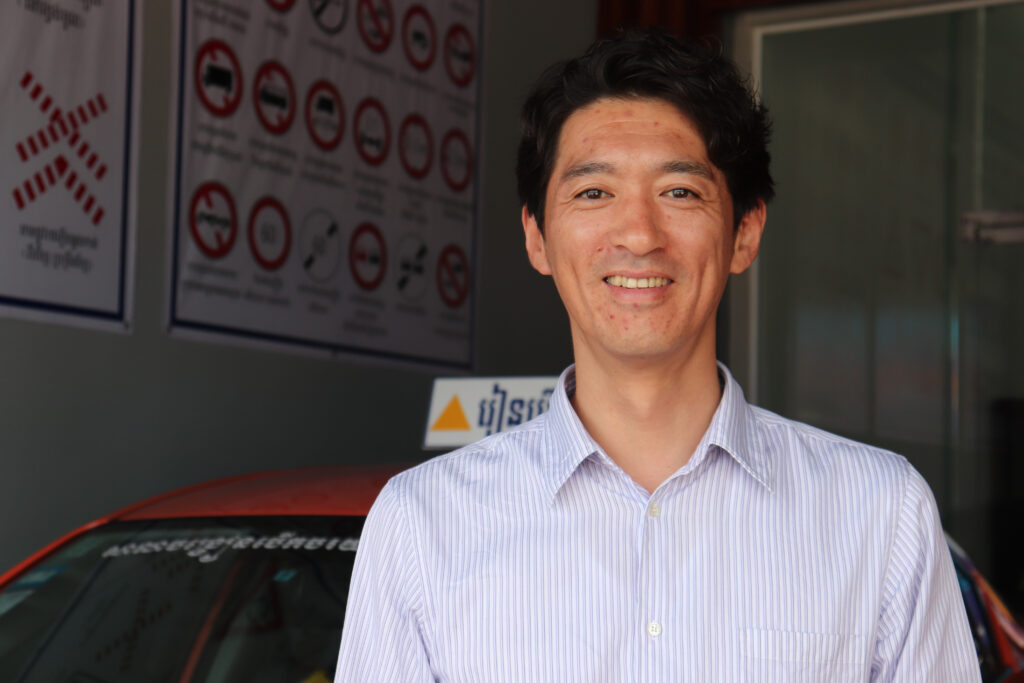Minami(CAMBODIA) Co., Ltd.
CEO Mr. Ryosuke Kobayashi
– Can you tell us what made you decide to start the overseas expansion with a driving school?
Cambodia is actually not the first overseas expansion for us. We started with Vietnam 3 years ago so Cambodia is the second country. As you know, the declining birth rates or the shift away from buying a car have been gaining social attention in Japan but the rate of holding a driver’s license among people under 29 years old hasn’t changed. But still, the situation won’t be the same. First, there’ll be fewer people. Secondly, automatic driving will be more common. We don’t think that driver’s license will go out of use but it will be simplified and cheaper for sure. Our overseas expansion started when we thought that we had to figure out how to make a profit and maintain our company.
– Has any other company done overseas expansion in this business field?
Honda’s driving schools are all over Japan and they expanded to Singapore almost at the same time as we did. But as of now, that’s the only case we know.
– Then, wasn’t it quite challenging for you?
Yes, it was. As we knew that it would be challenging, we made a joint corporation of 4 companies that includes 3 driving schools and a school that offers a system for driving schools to expand to Vietnam.
– Vietnam was your first overseas expansion. Why did you pick up Cambodia as the second country?
As countries where motorization hasn’t progressed much have less chance of automatic driving getting common, we wanted to continue our business in Vietnam. But Vietnam’s got a strict restrictions on foreign investment plus there’re various problems such as you’re required to have the same driving course as in Japan or marking for driving tests has to be done with sensors because Vietnamese don’t like the idea of someone marks a score for them. As we must face these problems, the initial investment becomes quite big in Vietnam. When we considered that, Cambodia was our choice where we don’t have to put so much initial investment, 100% foreign-owned companies are allowed and the same course as in Japan is not required.
– It seems like the process until now was not as smooth as you expected. Were there a lot of gaps between what you were planning before coming here and what things actually happening to you?
It was last January when we decided to expand to Cambodia and we were thinking that we could open in June or possibly in September in case of delays. But it ended up taking 1 and a half years longer than we expected.
– Was it because you were the first foreign-owned driving school in Cambodia?
We thought there wouldn’t be any restriction on foreign investment but as soon as we proceeded with incorporation, the restriction started and we were required to have a Cambodian shareholder with more than 51% of the share. It goes without saying that we had to change our plan and had to find a Cambodian partner.
– I didn’t know that restrictions could be made and imposed that quickly.
I didn’t know either.
It was actually not entirely because we were a foreign-owned company. There were not so many cases of a driving school being established even by a Cambodian corporation in the first place. So we had to ask a law office for help to prepare the required documents and conditions for the license. But it turns out most of them had not been renewed since the minister of Public Works and Transport changed so there were even some government offices preparing new documents from scratch.
– If that’s the case, I bet you had hired staff up to that time and therefore had to keep paying expenses while waiting for the license issued without knowing how long it would take. Didn’t you think of withdrawing from Cambodia?
There is a qualification for teachers at driving schools as well and it is a must to get the license so we had to hire at least two employees who hold it. What we did was we made an employment contract with teachers and made a deal that we would officially hire them after getting the license. Until we got the license they helped us and in return, we paid them for what they did. It was like paying a contingent fee.
So it was not like our expenses kept getting bigger. But still, we had to pay rent and stuff so we worked on different businesses such as a Japanese language school or chauffeur business so that we could start them first.
– What made you decide to do a Japanese language school?
Our specialty is the education business at the end of the day. So when we considered business other than driving school, we thought it should be another education business. In that sense, we felt that the only thing we could do was to teach something that does not vanish and brings skills, knowledge, and income.
We think that there should be a need for a taxi driver who can communicate in Japanese and if so the taxi driver could get proper profit. That was the main reason why we thought of doing a Japanese language school.
– Then, are you going to train taxi drivers?
I guess the existing driving schools target the high-income class but we’d like to target low-income class people and do something to raise their income.
– And that leads you to the car lease business?
Yes, it does. I guess there’ll be cases where someone has studied Japanese and got a driver’s license but doesn’t have a car. That’s when we lease our car.
– It sounds like a taxi company.
True. But there are already 8 taxi companies in Phnom Penh and the city said no more taxi companies would be allowed. So when we look forward, doing a taxi company could be possible in Sihanoukville or Siem Reap but not realistic in Phnom Penh.
– There are various driver’s licenses such as for large-size vehicles or second-class licenses in Japan. Are you going to cover them as well?
Well, we applied only for licenses for normal vehicles this time but we have a plan of having our own courses like in Japan so that we can cover licenses for taxi drivers, truck drivers, or bus drivers. We have actually bought land for that so we just have to work step by step following the plan.
– Is there any regulation when you make a course?
There’s only one course in Phnom Penh and as far as I know, there’s no regulation for that. So it’s like course tests are skipped and road tests start without any preparation. There’s a standard for a course in Japan and that of Vietnam and Cambodia are similar to Japan’s one. We assume 8000 sqm should be big enough.
– Can you tell us your future plans?
I think we have to focus on establishing our business in Phnom Penh first. As the first thing to do, we are going to work on educational institutions and curricula for professional drivers. As of now, each driving school uses different textbooks so we hope we could sort of adjusting the standard for textbooks.
– When is the driving school going to be open?
Next week at the earliest. We’ve been putting ads on Facebook and when we joined the Kizuna festival the other day, 1200 people temporarily applied to our school. We are going to contact and inform them of when we open the school first. Speaking of the price, other schools cost usually around $150 but our school costs $200. We are going to follow the Cambodian teaching method and in addition, we hope we could make a curriculum that reflects Japanese and Minami’s, our parent company, teaching methods. The goal we offer is still the same, a driver’s license, but we’d like to offer something more than that in some way.

